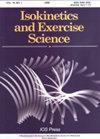两种不同伸展运动对肌腱单位和运动范围的影响
IF 0.6
4区 医学
Q4 ENGINEERING, BIOMEDICAL
引用次数: 0
摘要
背景:拉伸通常用于临床和运动,但效果随时间和使用的技术而变化。目的:确定腓肠肌静态和动态拉伸对同一个体肌肉-肌腱单位(MTU)和背屈运动范围(ROM)的急性影响;看看拉伸效果能持续多久。方法:男性28例,平均年龄22.18±2.58岁。右腿进行5次45 s的静态拉伸(SS),另一条腿进行相同时间的动态拉伸(DS)。超声检查MTU变化,测角仪测量主动和被动ROM。所有评估分别在拉伸前、紧接后、拉伸后5分钟、15分钟和30分钟进行。结果:两种方法的肌肉厚度和笔触角度均未随时间变化(p < 0.05)。术后肌肉-肌腱连接处(MTJ)明显移位(p< 0.05);DS后变化最大(p< 0.05)。两种技术提高主动ROM值相似(p< 0.05),但只有动态拉伸显著增加被动ROM (p< 0.05)。30 min时主动、被动ROM和MTJ位移值仍高于基线(p< 0.05)。然而,SS在应用后立即增加了有效ROM角,但这种增量在最终测量之前一直下降。结论:我们推荐使用动态拉伸技术来实现更大、更持久的肌腱长度和活动范围的增加。本文章由计算机程序翻译,如有差异,请以英文原文为准。
The effect of two different stretching exercises on the muscle tendon unit and range of motion
BACKGROUND: Stretching is commonly used for clinical and sports reason but the effects vary on time and the technique used. PURPOSE: To determine the acute effects of static and dynamic stretching of gastrocnemius muscle on muscle-tendon unit (MTU) and dorsiflexion range of motion (ROM) in the same individuals; to find out how long the stretching effects endure. METHODS: Twenty-eight males (mean age: 22.18 ± 2.58 years) were included in the study. A 45-s static stretching (SS) exercise was applied to the right leg 5 times and dynamic stretching (DS) of same duration to the other leg. Change in MTU was assessed by ultrasonography and active and passive ROM was measured with goniometer. All evaluations were performed before, immediately following, 5-min, 15-min and 30-min after stretching. RESULTS: Muscle thickness and pennation angle did not change over time with either techniques (p> 0.05). A significant muscle-tendon junction (MTJ) displacement occurred after the techniques (p< 0.05); the highest change was achieved after DS (p< 0.05). Both techniques improved active ROM values similarly (p< 0.05), but only dynamic stretching increased passive ROM significantly (p< 0.05). Active and passive ROM and MTJ displacement values at 30th – min were still higher than the baseline ones on the DS side (p< 0.05). However, SS increased active ROM angle immediately after application but this increment declined until the final measurement. CONCLUSION: We recommend using the dynamic stretching technique to achieve greater and longer lasting increases in tendon length and range of motion.
求助全文
通过发布文献求助,成功后即可免费获取论文全文。
去求助
来源期刊

Isokinetics and Exercise Science
医学-工程:生物医学
CiteScore
1.20
自引率
14.30%
发文量
37
审稿时长
>12 weeks
期刊介绍:
Isokinetics and Exercise Science (IES) is an international journal devoted to the study of theoretical and applied aspects of human muscle performance. Since isokinetic dynamometry constitutes the major tool in this area, the journal takes a particular interest in exploring the considerable potential of this technology.
IES publishes studies associated with the methodology of muscle performance especially with respect to the issues of reproducibility and validity of testing, description of normal and pathological mechanical parameters which are derivable from muscle testing, applications in basic research topics such as motor learning paradigms and electromyography. The journal also publishes studies on applications in clinical settings and technical aspects of the various measurement systems employed in human muscle performance research.
The journal welcomes submissions in the form of research papers, reviews, case studies and technical reports from professionals in the fields of sports medicine, orthopaedic and neurological rehabilitation and exercise physiology.
 求助内容:
求助内容: 应助结果提醒方式:
应助结果提醒方式:


